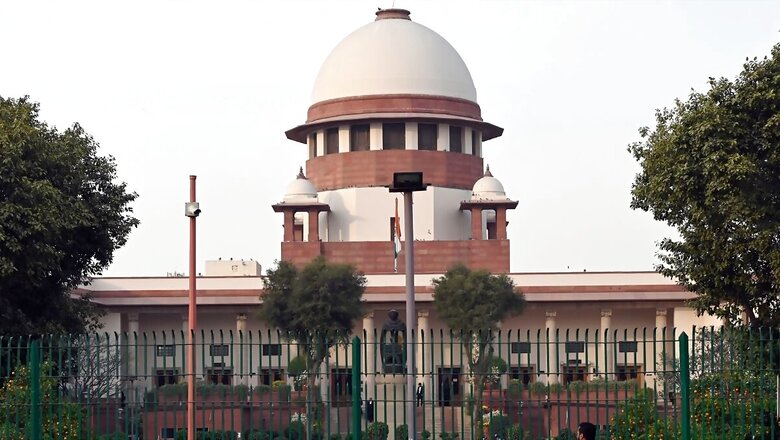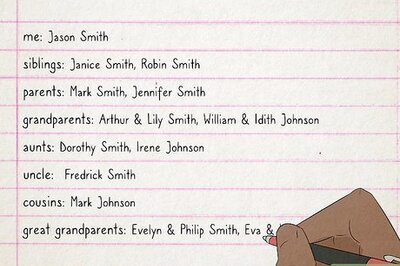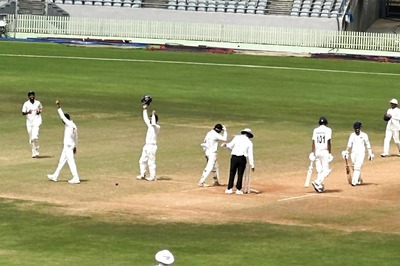
views
As Manipur grappled with protracted ethnic strife, the Supreme Court Friday asked the Centre and the state government to ensure uninterrupted supply of basic commodities like food and medicines to people facing economic blockade in certain areas of the border state.
A bench of Chief Justice DY Chandrachud and Justice JB Pardiwala also directed the state government to explore all options to deal with the blockades, which are disrupting essential supplies to the affected people. The court said the option of air-dropping the supplies, if needed, should be considered.
“We direct that both the Union government and the state of Manipur should ensure that basic supplies of food, medicines and other essential items continue to be distributed in the affected areas so as no part of the population suffers on account of an existing or apprehended blockade,” the bench said.
It said the manner in which such blockades shall be dealt with is the matter for the law enforcement agencies to consider, but bearing in mind the humanitarian situation involved, the government should explore all possible options including air-dropping the supplies.
The court said it be apprised of the specific steps taken to ameliorate the situation.
The bench recorded the submission of Solicitor General Tushar Mehta, appearing for the Centre and the Manipur government, that nodal officers have been appointed by the Union of India and the state pursuant to its earlier orders to facilitate the functioning of the court-appointed all-women committee of judges to oversee relief and rehabilitation in the strife-torn state.
The panel headed by Justice (retired) Gita Mittal, a former chief justice of the Jammu and Kashmir High Court, also comprises Justices (retd) Shalini P Joshi and Asha Menon.
“An official communication in that regard shall be provided to the chairperson of the committee, within 48 hours. The nodal officers shall act as point of contact for facilitating the meetings and all other directions of the committee which are made on the ground,” the bench ordered.
It granted Mehta time till next Wednesday to seek further instructions on the six reports filed by the committee to enable him to make statements at the next hearing.
The batch of petitions filed by various individuals, including those from Manipur and civil society groups, will be taken up for hearing on September 6, the bench said.
At the outset, senior advocate Meenakshi Arora, appearing for the court-appointed committee, said it needs to be brought to the notice of the court that there are blockades in Moreh area of Manipur and people can’t get even basic supplies of rations.
She said while people are starving due to blockades, information has come in about an outbreak of chicken-pox and measles in some relief camps.
“What you are saying (about), the state government can be easily apprised (of) and necessary action will be taken. Mr. Solicitor General please find a way for the committee to directly tell the government,” the CJI said.
The bench directed senior advocate Huzefa Ahmadi, who appeared for an intervenor and claimed 642 religious places have so far been destroyed, that a note on the issue be shared with the committee and the solicitor general for appropriate action.
Senior advocate Jaideep Gupta, appearing for one of the parties, said the committee could not do anything when it came to economic blockades.
Senior advocate Indira Jaising, also appearing for one of the petitioners, said, “There is no food in Moreh area. The problem is the blockades in the area. The committee cannot direct the armed forces to remove the blockade.” The CJI said removing blockades was “easier said than done” as the problem was complex and required careful consideration because of the involvement of local people.
“Removing a blockade is not about directing the armed forces to do it. There are sensitive issues….because the blockades are done by local people,” the bench said.
Another counsel, appearing for one of the parties, said humanitarian aid should not be limited to Moreh area alone.
“There are blockades in various places and not only in the Moreh area. There are blockades at various places on National Highway-2 which runs from Assam to Mizoram via Manipur and Nagaland,” he said.
The bench said whatever issues are being flagged the solicitor general is taking note of them and will apprise it next Wednesday.
It asked Mehta to seek instructions about bringing uniformity in awarding compensation to the victims of violence.
On being told that a large number of bodies are lying in morgues and needed to be disposed of in a dignified manner, the bench said the government will have to take a call so the unclaimed bodies don’t spread diseases.
Manipur plunged into a vortex of violence in May over a high court order directing the state government to consider including the non-tribal Meitei community in the list of Scheduled Tribes.
This order led to rampant ethnic clashes. More than 160 people have been killed and several hundred injured since ethnic violence first broke out in the state on May 3 when a ‘Tribal Solidarity March’ was organised in hill districts to protest against the majority Meitei community’s demand for Scheduled Tribe status




















Comments
0 comment